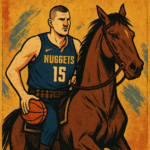 (Please excuse BallinEurope’s more personal tone today; trust me, i have as healthy a loathing for usage of the first-person in sports blogging as you no doubt do. On the other hand, it is called *You*Tube.)
(Please excuse BallinEurope’s more personal tone today; trust me, i have as healthy a loathing for usage of the first-person in sports blogging as you no doubt do. On the other hand, it is called *You*Tube.)
When i was coming of age in the Cold War 1980s, there wasn’t one basketball universe but rather two developing in parallel. While we were thrilling to the likes of Bird ‘n’ Magic and Pat Riley’s coaching, Eastern European hoops were witness to studs such as Valdis Valters, the immortal Arvydas Sabonis and mighty mastermind Alexander Gomelsky.
Of course, over there in the ‘States, we knew basically nothing about such things: In the Ronald Reagan Era crazy stuff like the “Euroleague” and “Eurobasket” was all but utterly unknown, just another item filed by America’s Cold War propagandists under “forbidden communist culture” and thus kept neatly off the pop culture radar. (Yes, Virginia, we had our propaganda, too.)
Instead, to the eyes of an American child, the Soviet Union and its allies were a dread force wearing red uniforms bearing that fearsome anagram CCCP which sought to humiliate our valiant athletes once every four years in Olympic gymnastics, hockey, track-and-field, weightlifting, volleyball, etc. (We’d also occasionally get the USSR-USA matchup in the FIBA World Championship, but USA Basketball never seemed to take that tournament very seriously.)
The news cycle went something like this: the American public would grumble about the unfairness of our young amateurs having to go against essentially paid professionals; the Games would be played to a steady background in the public consciousness of jokes about steroids, hormones and cheating; finally, directly following the snuffing of the torch and just before collectively forgetting that socialists even played sports for another four years, mass media would crank out the horror stories about communist-nations’ teams being jailing or otherwise punished for their egregious losses. (Amazingly, this last tradition was recently exhumed for *international* “reportage” of the North Korean football team post-World Cup 2010.)
Today, if you ask any American over the age of 50 (no, i’m not quite that old) for the two most memorable Olympic events, he/she is virtually guaranteed to name the 1980 “Miracle on Ice” hockey match and the 1972 gold-medal basketball game between those two towering rivals from the USA and the USSR.
But here’s the thing: What the great majority of American basketball fans remember/are taught about that game is simply its controversial ending – a conclusion that many now believe was set up by someone, somehow, to end Team USA’s 71-0 run.
 As a result, over there in the ‘States – and thus because of the pervasiveness of American pop culture and information dissemination online, much of the world – little beyond the final re-replayed three seconds of the game is remembered. In what otherwise would be remembered as the last great meeting between USA and USSR for ultimate international basketball glory, the 1972 battle for Olympic gold has become known as Team USA vs. The Communist Referees. Indeed, it seems that what most folks know about this match today was the unfairness of it all and the continued petulance of Doug Collins and his teammates regarding the silver medal.
As a result, over there in the ‘States – and thus because of the pervasiveness of American pop culture and information dissemination online, much of the world – little beyond the final re-replayed three seconds of the game is remembered. In what otherwise would be remembered as the last great meeting between USA and USSR for ultimate international basketball glory, the 1972 battle for Olympic gold has become known as Team USA vs. The Communist Referees. Indeed, it seems that what most folks know about this match today was the unfairness of it all and the continued petulance of Doug Collins and his teammates regarding the silver medal.
Gone are memories of the sweet play of Ivan Edeshko; of the evolutionary Soviet defense that held a Team USA who’d been averaging over 76 points a game to just 50; and most of all the dominance of Alexander Belov, one of the greatest never to play in the NBA.
Gone, that is, until YouTube.
This YouTube video, entitled simply “Munich 1972 Final USA-USSR” was created “as a tribute to Alexander Belov [who] made a lay-up as time expired for the final margin of 51-50.” Were it not for the politics and history behind it, we might be able to admire this clip as an excellent compilation of some great basketball from the 1970s.
Nevertheless, even with the established history of the game in place, this YouTube takes the game back, removing it from the realm of rhetoric and bombast to re-present Belov’s greatness for younger folks who don’t even remember the Soviet Union. With this video (and others like it), the basketball teams from “behind the Iron Curtain” nations might finally attain the historical importance they deserve. Such a video reminds us that basketball is supposed to be discussed in terms of, you know, basketball, and not geopolitics.
Most of all, YouTube user Apofteso demonstrates in this clip that there are always (at least) two sides to every story deserving to be heard – and isn’t that what democracy is really about?
Incidentally, if you’re interested in checking out the entire 1972 USA-USSR Olympic gold-medal game, YouTube’s got that as well. Part one may be viewed by clicking here.




